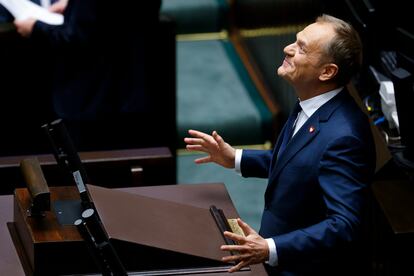Donald Tusk, the politician who has halted Poland’s ultra-conservative drift
After seven years in Brussels, the new prime minister returns to the Polish Government with the mission of dismantling the illiberal system built by the national-populist Law and Justice party


Donald Tusk has returned to the summit of Polish politics as prime minister. As hated as he is adored in his country, the liberal politician successfully ousted the conservative Law and Justice party (PiS) from power, which failed in its attempt to form a government after the October elections. After leading the European Council and the European People’s Party (EPP) in Brussels, Tusk returned to Warsaw to guide his country back to the center, as he did in 2007. This time around, the 66-year-old leader aims to dismantle the undemocratic system established by his political rival, Jaroslaw Kaczynski, and restore the rule of law.
In the Polish political context, Tusk is relatively progressive compared to PiS, but he’s no revolutionary. The last time he was PM, Tusk advocated for liberal economic principles but took tough stances on refugees and refused to consider social measures like legalizing abortion. The new Tusk has evolved and seems more receptive to social initiatives, but still aligns with European populists on issues such as tax reduction, limited government and opposition to immigration. He also still falls short on recognizing LGBTQ+ rights. Brussels sees Tusk as a constructive, pro-Europe partner, but he won’t be a pushover.
Tusk is public enemy number one for many Poles and a hero for others. According to an IBRiS survey conducted for Rzeczpospolita newspaper, 41.8% of people hold a negative view of the new prime minister, while 31.2% view him positively. Pawel Jabłoński, a PiS legislator and former Foreign Ministry official describes Tusk as unscrupulous, arrogant, and dictatorial, while his PPE allies praise his focus, humility, intelligence and ability to evolve.
The image that many Poles have of Tusk is shaped in part by years of PiS smear campaigns. Jacek Kucharczyk, president of the Institute of Public Affairs think tank, says that Tusk has been accused of “horrible things.” Some even blamed Tusk for the death of former president Lech Kaczynski, Jaroslaw’s twin brother, in a 2010 plane crash that killed 96 people, including many of Poland’s highest military and civilian leaders. And in the recent elections, state-owned media outlets often described him as a traitor who would sell out his country to the EU, a German puppet and a Russian lapdog. But Poland’s left wing doesn’t seem to care for Tusk either.
Kucharczyk says he admires Tusk, who co-founded the Civic Platform party and cobbled together a coalition with Third Way’s Christian Democrats and Lewica, a catch-all bloc of the Polish left. “Since 1989, he has emerged as one of the most remarkable political leaders in Poland, if not the most exceptional,” said Kucharczyk, who believes Tusk has the capacity to evolve and remain a centrist liberal. “He’s a politician who relies on trial and error but never gives up.”
A Solidarity trade union member
The son of a carpenter and a nurse, Tusk studied history at the University of Gdańsk. The city is famous for being the birthplace of the legendary Solidarity trade union, which played a significant role in overthrowing the communist regime. Tusk himself joined Solidarity in 1980. Before entering politics, he worked as a bricklayer specializing in high-altitude construction and also as an industrial painter. After the country’s first semi-democratic elections in 1989 that toppled the communist regime, Tusk played a part in establishing two liberal parties influenced by the economic theories of Thatcher and Reagan. Years later, he co-founded Civic Platform in 2001.
Civic Platform participated in the 2001 elections alongside Law and Justice, a recently formed party led by the Kaczynskis, who also emerged from Solidarity. The Kaczynski twins won on a pro-church, nationalist platform advocating family values. In 2005, Tusk ran against Lech Kaczynski for the presidency. In an effort to appeal to PiS voters, Tusk moved towards the right and even celebrated a religious wedding with the mother of his two children. However, a Kaczynski brother emerged victorious once again.
PiS immediately clashed with the EU, which Poland had recently joined in 2004, and there was heavy friction with Germany and Russia. In 2007, after high-profile corruption and illegal wiretapping scandals, early elections were held and Tusk finally won. His aim was to position the country at the center of the EU. “His top priority has always been the stabilization of Polish democracy, both then and now,” said Kucharczyk.
Tusk managed to steer through the 2008 economic crisis during his first term, but made mistakes such as not firing PiS loyalists who later torpedoed his administration. His second term was blemished by corruption scandals and public protests. “Many people recall those years as a time of economic crisis and unpopular laws, like raising the retirement age. This led to significant public opposition,” said Paweł Jabłoński.
As president of the European Council between 2014 and 2019, Tusk faced constant turmoil like the euro shock and debt crisis, the refugee crisis in 2015 and 2016, and above all, Brexit. After being appointed EC president, the Polish leader quickly learned English and honed his negotiation skills. He eventually went on to become the president of the European Popular Party. In Brussels, he commuted to the EPP headquarters on foot or by scooter. Life there was quieter compared to Poland, where plans to attack him and his family were foiled by the police. However, in May 2022, he made the decision to return to Polish politics.
A boost for Civic Platform
Tusk’s return gave a big boost in the polls to a free-falling Civic Platform. He continued to support the liberal economy, but he had learned from his mistakes, whether out of conviction or opportunism. He no longer opposed PiS’s social welfare initiatives, and instead promised to uphold them. He also shifted his stance on certain social issues, such as the legalization of abortion and the separation of church and state. Tusk also made numerous campaign sweeps through rural Poland in addition to the cities.
The 2023 election campaign was fierce. Once again, he found himself facing off against a Kaczynski in a battle to define the future of Poland’s democracy and firmly establish the rule of law. The candidates debated major issues like EU encroachment on national sovereignty and Christian values. The Law and Justice party won the most votes, but the Tusk-led liberal opposition commanded the necessary majority to govern. “In both 2007 and now, I can’t envision a totalitarian defeat without his [Tusk’s] leadership,” said Kucharczyk.
The Tusk government will start its mandate by purging public institutions and companies of PiS appointees. It aims to rebuild the rule of law while facing certain opposition from President Andrzej Duda. However, Tusk has prior experience governing with an opposition party president — Lech Kaczynski in 2007. The Law and Justice party has already begun attacking, anticipating the coalition’s collapse. “They have numerous political differences, but the one thing that brings them together is their opposition to PiS,” said Jablonski. Tusk recently described himself as a deal personified.
After a vote of confidence in his government on December 12, Tusk will be inaugurated the next day. The new prime minister is eager to join this week’s European Council meeting and reaffirm Poland’s position at the decision-making table in Brussels, a realm he is intimately familiar with. According to a former team member, Tusk brings hope for a shift away from the far-right in the EU.
Sign up for our weekly newsletter to get more English-language news coverage from EL PAÍS USA Edition
Tu suscripción se está usando en otro dispositivo
¿Quieres añadir otro usuario a tu suscripción?
Si continúas leyendo en este dispositivo, no se podrá leer en el otro.
FlechaTu suscripción se está usando en otro dispositivo y solo puedes acceder a EL PAÍS desde un dispositivo a la vez.
Si quieres compartir tu cuenta, cambia tu suscripción a la modalidad Premium, así podrás añadir otro usuario. Cada uno accederá con su propia cuenta de email, lo que os permitirá personalizar vuestra experiencia en EL PAÍS.
¿Tienes una suscripción de empresa? Accede aquí para contratar más cuentas.
En el caso de no saber quién está usando tu cuenta, te recomendamos cambiar tu contraseña aquí.
Si decides continuar compartiendo tu cuenta, este mensaje se mostrará en tu dispositivo y en el de la otra persona que está usando tu cuenta de forma indefinida, afectando a tu experiencia de lectura. Puedes consultar aquí los términos y condiciones de la suscripción digital.








































